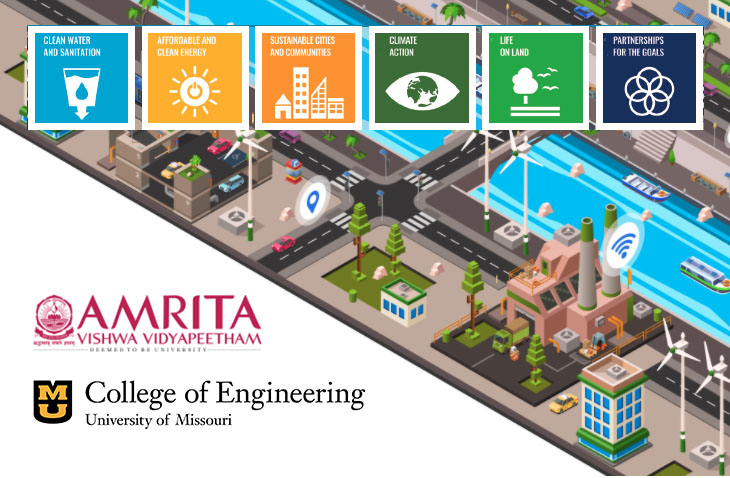Mizzou Engineering has formed a partnership with a top-ranked university in India to foster collaboration among researchers and students. The partnership between Mizzou and Amrita Vishwa Vidyapeetham aims to promote cooperation through joint research and publications, international initiatives, training programs and student exchanges.
It kicked off last month at an international symposium. During the two-day virtual event, faculty from each university shared research interests and teaching methods to identify crossover areas and potential collaborations.
“It went really well,” said Prasad Calyam, associate professor of electrical engineering and computer science (EECS) and a technical co-chair of the event. “We received a lot of positive feedback from attendees and identified several thematic areas to focus on.”
Those areas include artificial intelligence and computer vision; cyber security and cryptography; water resource management and agriculture; sustainability; and wireless infrastructure.
“The symposium was lively, with lots of discussions, and helped identify potential collaboration areas and research questions across the college,” said Rohit Chadha, EECS associate professor and technical co-chair for the event.
Both countries are especially interested in advanced wireless platforms, Calyam said. This past year, the National Science Foundation funded a Platforms for Advanced Wireless Research program to enable exploration of new wireless devices, communication techniques and network systems. Such platforms could lead to more so-called “smart cities” and improved connectivity in rural communities for applications in farming, public safety and healthcare.
“One future possibility is for Mizzou and Amrita to propose the creation of joint wireless infrastructure or research testbeds,” said Calyam, who is director of the Mizzou Center for Cyber Education, Research & Infrastructure (CERI). “We could go as bold as that.”
In the more immediate future, faculty from both institutes are working on providing joint supervision or mentorship opportunities for PhD. students. An upcoming workshop is expected to help graduate students connect to international faculty members who share research interests.
“Amrita has access to a lot of real-world data through their initiatives in diverse communities, and we see many synergies in jointly developing innovative data analytics methodologies,” Calyam said. “It’s a win-win for both universities to exchange ideas and find scientific synergies that can make positive impacts for our society.”
Last week’s symposium featured 13 speakers from Mizzou, including faculty from bioengineering, civil and environmental engineering, electrical engineering and computer science, and agricultural systems technology. Giovanna Guidoboni, associate dean of research for Mizzou Engineering, was a keynote speaker.
